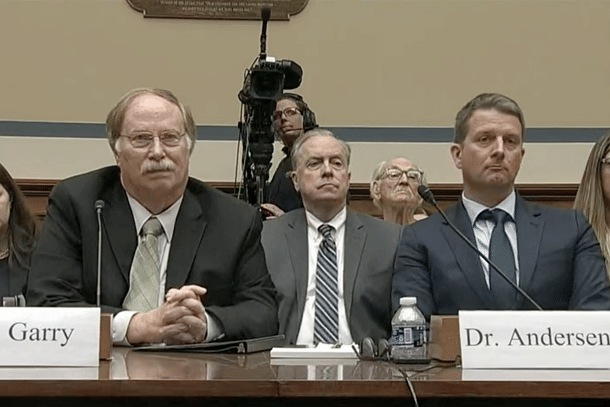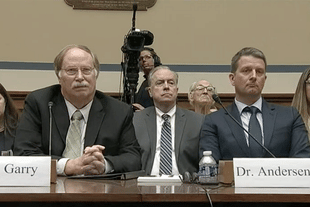Science
People Misled On Covid-19 Origins? Top Scientists Believed Lab Leak Was Possible But Declared Otherwise In Public
Swarajya Staff
Aug 04, 2023, 07:34 PM | Updated 07:33 PM IST
Save & read from anywhere!
Bookmark stories for easy access on any device or the Swarajya app.


The controversy surrounding the Covid-19 origins, as well as the discourse around it, has grown murkier — of course, not helped by China's cover-up all along — after it came to light that top Western scientists held contrasting views on the matter in public and private.
By quickly and boldly dismissing the possibility of a laboratory origin for Covid-19 while thinking otherwise in private, reports say, scientists misled the public and hindered a credible investigation from taking place.
Speaking to reporter Ian Birrell, one prominent US biologist called this episode "the biggest scientific scandal of our lifetime."
On 17 March 2020, a paper titled 'The Proximal Origin of SARS-CoV-2' was published in the journal Nature Medicine by five scientists. It explicitly ruled out a laboratory-based scenario for the origin of the pandemic, claiming that the virus emerged naturally.
However, recently released Slack messages and emails, obtained through a subpoena by the House Oversight Select Subcommittee on the Coronavirus Pandemic, suggest that some of the authors had doubts about their own conclusions.
While the scientists privately expressed concerns that Covid-19 might have originated from a laboratory escape, potentially involving a genetically engineered virus, the paper stated that their analyses clearly demonstrated that SARS-CoV-2, the virus behind the Covid-19 disease, was neither a laboratory creation nor a purposefully manipulated virus.
Shortly after the publication of the paper, Francis Collins, the then director of the National Institutes of Health (NIH), published a statement on the NIH website stating that the study left little room to question the natural origin of Covid-19.
Anthony Fauci, the then director of the National Institute of Allergy and Infectious Disease, also declared from the White House podium that the paper's data were entirely consistent with the virus jumping from an animal species to humans.
China's Ministry of Foreign Affairs and the Communist Party chief at the Wuhan Institute of Virology (WIV) welcomed the article as "evidence" of a natural origin.
The mainstream media regularly dismissed any discussion of a lab leak as a conspiracy theory. Facebook also censored this topic for a year. However, the Federal Bureau of Investigation and the Energy Department now believe that the pandemic likely originated from research.
Messages from lead author, evolutionary biologist Kristian Andersen of the Scripps Research, confirm that senior scientists in control of major funding bodies prompted them to draft a paper after a conference call on 1 February 2020. These scientists included Dr Fauci, Dr Collins, and Jeremy Farrar of the Wellcome Trust, who hosted the teleconference.
Just before the paper was made public, Edward Holmes, an evolutionary biologist and virologist from Sydney University, informed his co-authors that "Jeremy Farrar and Francis Collins are very happy" with the final draft.
On 19 February 2020, Farrar also signed a public letter in the Lancet "to strongly condemn conspiracy theories suggesting that COVID-19 does not have a natural origin."
It was later revealed that the letter was covertly organised by British scientist Peter Daszak, who directs an organisation that channelled significant US funding for bat coronavirus research to WIV.
Farrar is now chief scientist for the World Health Organization.
During a subcommittee hearing on 11 July 2023, one of the authors, virologist Robert Garry from Tulane University, explained that the contrast between their public and private opinions was due to scientists often taking a devil's advocate position.
Andersen also stated that changing one's mind based on new evidence is part of the scientific process.
However, the newly revealed messages indicate that the scientists did not change their minds. Even after an initial version of the paper was published online on 16 February 2020, they continued to privately advocate for the lab leak theory.
Even a month after publication, on 14 April 2020, Andersen was saying, "I’m still not fully convinced that no culture was involved," while acknowledging that the possibility of genetic manipulation in the lab couldn't be entirely ruled out.
In addition, he expressed concern over the Wuhan lab's research on live SARS-like viruses from bats at low biosafety levels.
Andersen told his colleagues that they needed to determine whether Covid-19 originated from natural evolution or engineering, as both possibilities seemed plausible.
He mentioned that Garry would not want the virus to have escaped from a lab — "GOF escape," referring to gain of function research, which raises the infectivity of viruses.
“The main thing still in my mind is that the lab escape version of this is so friggin’ likely to have happened because they were already doing this type of work and the molecular data is fully consistent with that scenario,” he said.
Garry, in a recent admission to a BBC podcast, acknowledged that in taking the position they did "maybe we went a little too far."
Privately, the scientists dismissed the widely accepted theory of the virus originating in a Wuhan animal market, referring to it as a "red herring." However, it was a different matter in public.
The reason behind their paper denying the plausibility of a laboratory origin may be found in their messages.
In early February 2020, Andrew Rambaut, an evolutionary biologist at Edinburgh University, suggested that due to the potential fallout (“the shit show that would happen...") from accusing China of any accidental release, it would be better to state that without evidence of a specifically engineered virus, it was impossible to differentiate between natural evolution and escape. Thus, they were content to attribute it to natural processes.
Andersen agreed with the idea that the conclusion reached was reasonable, despite his hate for "when politics is injected into science." However, he said, in this case it was impossible not to.
Ultimately, science should be about facts. But 'injecting' anything else into it dilutes the seriousness of the scientific process.
"Unfortunately, the behaviour of a few key scientific figures in the pandemic, seemingly desperate to appease China and protect their ties to high-risk research, has done the precise opposite (of helping cultivate trust in scientists)," Birrell writes in his column for UnHerd.
While the exact origins of the pandemic remain unknown, it is undeniable that Covid-19 emerged in Wuhan, a city with a significant collection of bat coronaviruses and a history of safety concerns in high-risk research.
"This murky affair appears to be the most terrible betrayal of science — and indeed of democracy — that was far darker and more disturbing than those sinister events that felled Oppenheimer seven decades ago," Birrell concludes.





